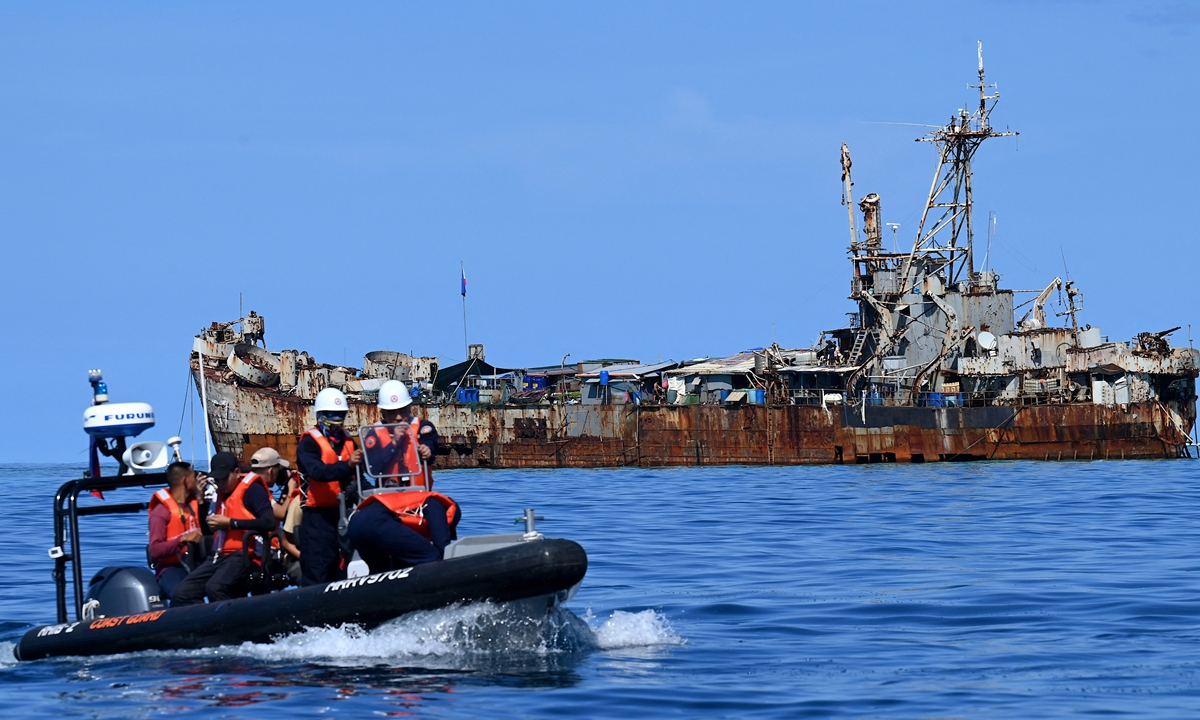
This photo taken on November 10, 2023 shows Philippine coast guard personnel and journalists sailing onboard a rigid inflatable boat (left) as they head back after filming the BRP Sierra Madre grounded at Renai Jiao in South China Sea. Photo: AFP
The US has reportedly acknowledged for the first time the existence of a task force named after Philippine name of China's Ren'ai Jiao (also known as Ren'ai Reef), which is backing Philippine military activities in the South China Sea. The move could encourage the Philippines to take bolder actions that could escalate tensions, but it cannot change China's capability and determination in safeguarding its rights, Chen Xiangmiao, director of the World Navy Research Center at the National Institute for South China Sea Studies, said on Thursday.
US Defense Secretary Lloyd Austin this week visited a command and control center in the western Philippine province of Palawan, and in a post on social media platform X, Austin said he "met with some American service members deployed to US Task Force Ayungin," in what appeared to be the first public acknowledgment of its existence, Bloomberg reported on Thursday.
Ayungin is the Philippine name for China's Ren'ai Jiao.
"Task Force-Ayungin enhances US-Philippine alliance coordination and interoperability by enabling US forces to support Armed Forces of the Philippines activities in the South China Sea," Kanishka Gangopadhyay, spokesperson at the US Embassy in Manila, was quoted by Bloomberg as saying in a statement on Thursday.
The Philippine military said on Thursday the US troops provide technical assistance that helps enhance Manila's maritime domain awareness, according to the Bloomberg report.
Chen told the Global Times on Thursday that he believes the Chinese side has long been aware of the existence of such a US task force, which has been training the Philippines' navy and coast guard forces and providing planning and guidance to the Philippines' maritime operations.
One reason why the US and the Philippines chose to make the US force's existence public now is probably to enhance US-Philippine bilateral relations and reduce the potential impact brought by change of the US administration, according to Chen.
Austin's visit could encourage the Philippines to make bolder moves that could escalate tensions, and the publicly announced existence of US forces supporting the Philippines also means that the US' grey zone tactics in using the Philippines to contain China is becoming more open, Chen said.
However, it is unlikely that the US forces will enter a direct confrontation with China, as the situation could spiral out of control and become too costly for the US, Chen said, noting that Washington will likely continue to encourage Manila to stir up more trouble.
China has the capability and determination to defend its rights on Ren'ai Jiao as well as safeguard the situation in the region, and this cannot be changed by either the US or the Philippines, Chen said. China will continue to take necessary measures in accordance to domestic and international laws to resolutely safeguard China's territorial sovereignty and maritime rights, he said.




